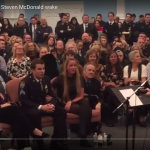 The following is the text of the Christopher News Note “Listening When God Speaks” (which was written by a freelancer). If you’d like a pdf or hard copy, see the end of this post:
The following is the text of the Christopher News Note “Listening When God Speaks” (which was written by a freelancer). If you’d like a pdf or hard copy, see the end of this post:
“Oh that today you would listen to His voice! Do not harden not your hearts.”
These words from Psalm 95 offer seemingly simple advice to those of us who try to follow Christ today. They tell us that we must open our hearts to God’s will for our lives; that we must be ready to hear and respond to God’s call. But what they don’t mention is how.
In a world with millions of distractions, it is all too easy for us to lose sight of God in the midst of housework or homework or a hard day at the office. Yet God continues to accompany us and speak to us, even in our busiest or most distracted moments. Our role is simply to calm ourselves and our minds enough to hear His message.
But how do we learn to recognize God’s voice and plan for our lives? How do we discern whether He is saying ‘yes’ or ‘no’ or something else entirely? How should we react when we feel God isn’t listening or responding to us? For most of us, these answers don’t come easy. Yet when we persevere in our faith — when we take the time to consider our lives, our relationships, our purpose — we can, as the poet Rainer Maria Rilke put it, “live along some distant day into the answer.”
Hearing God at Harvard
When Matt Weber arrived at Harvard University to pursue his graduate degree, following 18 years of Catholic schooling, he had a hard time finding God. It wasn’t that God’s voice was suddenly absent from Weber’s life; it was just that God’s voice was hard to hear because there were, as he puts it, “so many more noises.” Gone were the crucifixes in the classrooms, the morning prayers, the things that served as constant reminders of his faith throughout his childhood. It took Weber some time to get used to taking responsibility for his faith.
During his first weeks on campus, Weber considered himself an “incognito Catholic.” He avoided discussions about his plans for Sunday mornings or his prayer life. “It was tough, a bit rocky at first,” Weber said. “But I eventually learned to not only listen harder for God’s calling, but to also help amplify His voice.” Weber cleared away the static surrounding God’s voice by learning to use his own.
“I had to make the conscious effort to be open about my faith—unafraid and unabashed to share it with a largely secular audience,” he said. “Discussing religion, life, faith and my decisions became fluid and enriching. People of all different faiths (and no faith) engaged with me about religion and we had such beautiful conversations, where I learned more about their perspective, and they mine.”
Weber, who tells the story of his experience at Harvard in his book “Fearing the Stigmata,” embraced the idea to “remain open to God’s calling 24/7.” He can find God in holy moments on a plane, in the shower, or at sunrise. Yet even in these quiet times, it’s not always easy to understand how God is working in our lives. Weber acknowledges a tendency to give God “the cold shoulder” for a while when he feels God might be doing the same to him. “I never shut Him out of my life, but I get angry and mad, which I know is silly, on some level, but I think God understands because He knows how He made me.”
In his best moments, Weber strives toward empathy and understanding. “After 30 years of being Catholic, it’s not just the saying ‘yes’ that surprises me anymore — but the faith-filled moment that subsequently follows this daily reaffirmation.”
Pause, Reflect, Pray
Daniel P. Horan, O.F.M., understands what it’s like to enter into those faith-filled moments. In his early 20s, Father Horan was a successful and sought after photojournalist, specializing in sports photography. Then he heard and responded to God’s call for him to enter religious life. But while in formation, Father Horan received another call. A large New York newspaper offered him a prestigious staff photography job.
“I had to really pray and reflect on what it meant to be my true self, which is hard when you have what seems like two conflicting goods,” Father Horan said. He turned to prayer, reflection and spiritual direction, and decided to turn down the photography position.
“While going back to being a photographer probably would have been enjoyable and a good life, there was some other reason I had been attracted to exploring Franciscan life and ministry [so I thought] I should keep on that path, at least for a while,” Horan said. “Almost 10 years later, I’m still here.” He has since become the author of several spiritual books, most recently “The Last Words of Jesus.”
Listening and responding to what God desires for us helps us to shape our daily actions, and through this combination of prayer and action, we live our way into our vocations, whatever they may be.
“A lot of people seem to think that a vocation to religious life is some super clear, easily discernible message delivered directly from God like a phone call or divine text,” Father Horan said. However he says it is more like falling in love, “like a feeling you can’t shake.”
Noticing and responding to this feeling requires self-knowledge, including the knowledge that one is loved by God and that God wants the best for us and has created us. The search for God and self becomes inextricably intertwined. “To truly listen to God is to better get to know who God is — and who I am,” says Father Horan. “Pausing, reflecting, praying, and listening to God is the process of discovering this true self and vocation.”
Father Horan adds that listening to God means taking the time to be still enough to distinguish God’s will from our own. “Sometimes, although maybe more rarely than I’d like to admit, those two things align,” he said. But hearing God’s voice and will for us isn’t easy, even for the saintly. Mother Teresa famously felt God’s absence in her life for decades, but continued her work for the poor nonetheless. “I look to her as someone who models what it means to react in a fully Christian way when we feel God isn’t listening to us or isn’t responding,” Father Horan said. “Continue to live as Jesus taught us to live: loving God by loving our neighbors.”
Your Plans, God’s Plans
Lisa Hendey wanted to be a better example of this sort of love. A mother of two, she realized as her children reached the age for First Communion, that she wanted to be a knowledgeable guide for them as they grew in their Catholic faith. Hendey founded CatholicMom.com 14 years ago, from which has come several books, and which has nurtured dozens of volunteer writers.
Her book, “The Grace of Yes,” describes how we must work to cultivate a generosity of spirit that helps us to be open to God’s will for our lives. “It’s a daily ‘Yes, Lord,’” she said. “When I wake up in the morning, I ask ‘Is it still Your will that I be working on this?” Hendey said that, much as she loves her work on the website, she realizes that it might not always be in God’s plans for her.
Of course, it’s not always easy to recognize when those plans change. “Sometimes God has to beat me over the head with a sign,” Hendey said. She also works to be sure that her will doesn’t overwhelm God’s word. “A big part of my prayer is not to be prideful in this work and to do it with an attitude of service,” she said. “It belongs to all the people that are a part of it. It’s putting yourself into a position of openness.”
To remain in that state of openness, Hendey starts her day with prayer. And she says it’s easy to feel God at work in her life when things are going well. Yet she points out that she doesn’t interpret difficulties and challenges in her work as a sign that she is not following God’s will. “I have gone through periods where you feel less in tune with God’s presence in your life,” she says. “That’s when I learned to cling even more to the Eucharist and became even more determined about not neglecting my prayer life.”
Hearing What God Has to Say
For Sister Camille D’Arienzo, of the Religious Sisters of Mercy, prayer has been a source of both suffering and salvation. As a young woman in her 20s, she began to fear prayer. One of the older sisters she knew spent hours in the chapel every day and “came out as mean as can be,” she said. “I figured she was probably complaining to God about all the rest of us for her hurts, real and imaginary. I became suspicious of prayer.” Soon, however, D’Arienzo learned that prayer was less about telling God what she wanted, and more about “hearing what God had to say.”
While in the novitiate, she went through a difficult and considered leaving religious life. As she sat in the chapel one day, the tabernacle veil caught her eye. It was plain save for the word “Credo.” She began to pray simply, “I believe; help my unbelief,” echoing the words from Scripture. “That was a time of waiting for an answer and waiting for calm and waiting to have some sense that God noticed me,” D’Arienzo said. “Prayer to me is not necessarily words. It involves relationships. It’s how to live the love of God and love of neighbor in real ways and in real time.”
D’Arienzo, who has produced an audio book called “Stories of Forgiveness,” finds comfort in hearing God speak to her through others’ lives. “Among those who have strengthened my faith the most would be my late brother-in-law who was Catholic but who didn’t go to church except on Easter and Christmas.” A family man who didn’t drink or smoke, he died of colon cancer at 59.
Before his death, he met another Sister of Mercy in the hospital, and the two had vital, vibrant conversations about faith. D’Arienzo felt God speak to her through the witness and increased faith of her brother-in-law as he died.
“I learned from this man who went into illness with limited faith,” she said. “In his suffering he accepted the wisdom and spirituality of those who had been devoted to it and he gained peace. I too gained peace because of what I witnessed. God has been with me through hard times and wonderful times. I have no reason to think he will abandon me now.”
“I will instruct you and teach you the way you should go; I will counsel you with my eye upon you.”
Psalm 32:8
To receive a pdf or mailed copy of “Listening When God Speaks,” email your request to [email protected]











